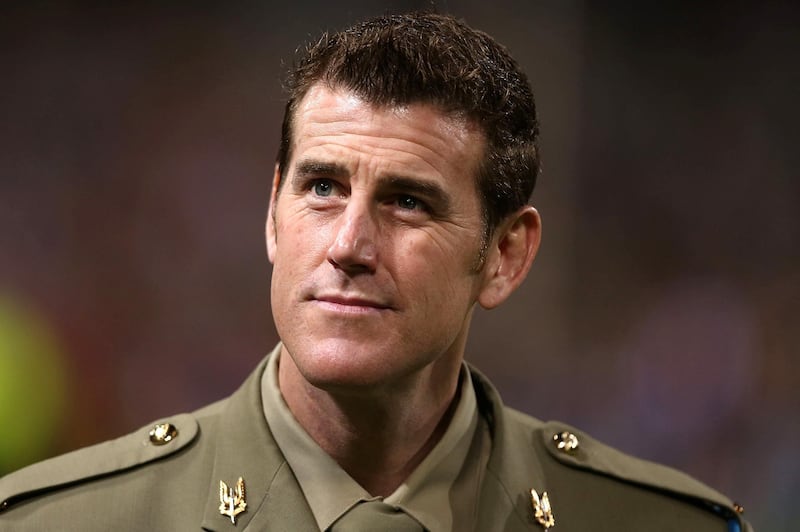One of Australia’s most decorated veterans is now the subject of a second war crimes investigation arising from his time in Afghanistan.
The Australian Federal Police have launched a second investigation into former Special Air Service Corporal Ben Roberts-Smith.
The new investigation is examining allegations the Victoria Cross recipient was involved in the summary execution of an unarmed man in southern Afghanistan in April 2009.
Mr Roberts-Smith is also being investigated over his alleged involvement in the murders of other unarmed men.
Multiple official sources who cannot be identified advised The Age and the Sydney Morning Herald newspapers that the two Federal Police taskforces investigating Mr Roberts-Smith have taken sworn eyewitness testimony from elite SAS soldiers or support staff who allege they witnessed Mr Roberts-Smith commit war crimes.
Mr Roberts-Smith has consistently and strongly denied all allegations of wrongdoing.
Australian historian Dr Phil Chilton, who teaches a course on the history of insurgency and terrorism at Curtin University, told The National that "to shoot first and ask questions later" was "standard operating procedure for the SAS".
“This is war. People need to realise, with all due respect to those who serve, if you go to war you are going to kill people and many of them will be innocents. War is not noble, it is dirty, and I think we need to take a long cold look at the ANZAC myth [the idea of Australian troops being fair, just and heroic without question],” he said.
The second inquiry into Mr Roberts-Smith is examining the alleged execution of an Afghan man who encountered the SAS during an operation in the village of Kakarak on Easter Sunday 2009. The man was in a compound that was subject to an assault by several SAS patrols, one of which included Mr Roberts-Smith as deputy commander.
The SAS believed the compound was sheltering several militants. Federal Police are investigating testimony from SAS members that implicates Mr Roberts-Smith in the execution of an unarmed Afghan man with a prosthetic leg who was found at the entrance to the compound.
The Age and the Sydney Morning Herald report that defence sources advise at least three SAS members have agreed to testify against Mr Roberts-Smith in a criminal prosecution, alleging the corporal executed the man. A photo of the dead man obtained by the newspapers shows him lying on his back with no weapon in view.
In September, newspapers revealed another Federal Police taskforce was investigating Mr Roberts-Smith over allegations he kicked a handcuffed and innocent detainee, Ali Jan, off a cliff in the village of Darwan in September 2012. Mr Roberts-Smith denies all wrongdoing, has a separate account of the day in question, and says his accusers are envious rivals.
In addition to two police inquiries, Mr Roberts-Smith is, alongside a small number of other soldiers, the subject of the Brereton inquiry - investigating allegations of war crimes in Afghanistan, specifically that detainees were summarily executed. Defence force chief Angus Campbell commissioned the independent inquiry in 2016.
The inquiries have been supported by serving and former special forces soldiers, including Afghanistan war veteran and now MP Andrew Hastie.
Dr Chilton told The National "people have to be held to account", adding that "who those people are is another matter".
“When anyone faces consequences for this stuff it’s the grunts [soldiers]. They do it because they think they are allowed to do it. We need to look at the leadership and at the people who sent them. Who is ultimately responsible is the successive leaderships of Australia who have kept this festering sore in Afghanistan going.”
He said Australia, alongside their allies are “quagmired” in Afghanistan.
“There is no prospective government to take over that is particularly savoury. People think war is an easy solution - a War On Terror, a War On Drugs - but you can’t solve complex problems in that way. We don’t have a leadership in Australia that is smart enough to realise that,” Dr Chilton said.
The news of the second investigation into Mr Roberts-Smith emerged on the same weekend as a missing military whistle-blower was found dead.
Sergeant Kevin Frost, who in 2016 told the Australian Broadcasting Corporation that he had helped to cover up the alleged murder of an Afghan prisoner, disappeared from his home in Busselton, Western Australia, last week.
Over the weekend his family confirmed the body of the 45-year-old veteran had been found, having “tragically passed away”. It is understood there were no suspicious circumstances.
Dr Chilton said the case of Sgt. Frost demonstrated the “terrible impact” of war.
“When you kill people, sometimes they are civilians, sometimes people who have no chance of fighting back – it has an impact. This is the nature of war,” he said.
Australian Prime Minister Scott Morrison says his Government will consider holding a Royal Commission into veterans' suicides. There have been more than 400 suicides by former and serving Australian Defence personnel since 2001.






